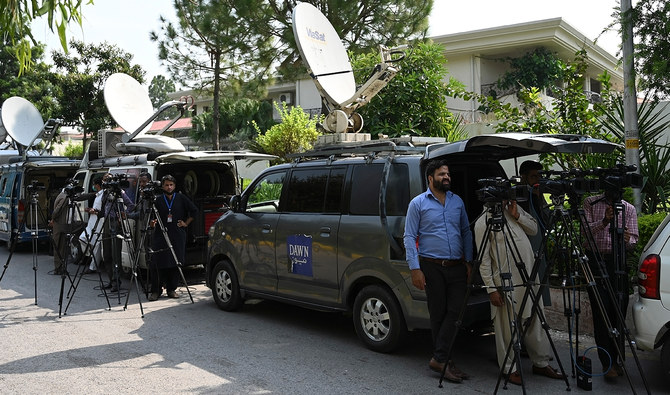ISLAMABAD: Senior Pakistani journalists warned on Saturday media freedom had been under intense pressure for over a year due to increasing political polarization in the country, adding they anticipated these restrictions to persist until the next elections scheduled to be held in October this year.
Political uncertainty engulfed Pakistan following the removal of former Prime Minister Imran Khan from power through a parliamentary vote of no-confidence in April last year, leading to heightened pressure on the media to water down his criticism against the government and military establishment during the public rallies.
Pakistan ranks 150 out of 180 countries on the Press Freedom Index by Reporters Without Borders (RSF). There has been more than 60 percent increase in the number of threats and attacks against journalists between May 2022 and March 2023, according to Freedom Network’s annual Pakistan Press Freedom Report that recorded at least 140 such cases during the same period.
“There is no editorial independence and no media freedom in Pakistan at the moment,” senior journalist and talk show host Mohammad Malick told Arab News. “The current curbs on the press freedom are one of the toughest in the last 25 years.”
“There is definitely serious curtailment on media freedom when you cannot even mention the name of a political party [leader],” he continued while referring to an unofficial ban on mentioning of ex-premier Imran Khan’s name on the media.
“This serious undeclared infringement on the press freedom is not going to ease up at least in the next five to six months,” he said, adding the situation was likely to continue even after the upcoming general elections.
Pakistan is scheduled to hold nationwide polls in October after the expiry of five-year term of the national and provincial assemblies, though uncertainty still looms over the exact dates of the electoral contest along with the number of parties and candidates who would participate in them.
“Political uncertainty in Pakistan has contributed to this squeeze on press freedom and freedom of expression,” RSF country representative and Freedom Network’s executive director Iqbal Khattak told Arab News.
“The squeeze on press freedom is against Pakistani constitution and fundamental rights of the people,” he noted. “Therefore, the superior judiciary should intervene to lift the curbs on the media.”
Khattak said journalist unions had been weakened and divided over the unannounced censorship in the country, making it easy for various power centers to stifle dissenting voices since journalists could no longer present a “united front.”
However, some broadcast journalists noted press freedom also depended on individual journalists.
“It is the choice of individual journalists if they want to self-censor things or be bold like me and say whatever they want to say in public interest,” senior journalist and talk show host Sana Bucha told Arab News.
She admitted there were instructions not to mention the name of ex-PM Khan on television or invite some lawyers and political leaders on current affairs programs, though she added she did not have any issue if someone who wanted “to spread anarchy in the society” was banned from the media.
Pakistan Federal Union of Journalists (PFUJ) also acknowledged media censorship in the country while urging all political parties and civil society groups to work with the journalists to strengthen the press freedom and freedom of expression in the country.
“A vibrant democracy and media freedom go hand in hand in any country, but in Pakistan the press freedom has worsened in the last eight to ten years with political and economic uncertainty,” a former PFUJ president, Shahzada Zulfiqar, told Arab News.
“Political parties support journalists and press freedom while they are in opposition. But they tend to impose restrictions when they come into power,” he added.

















